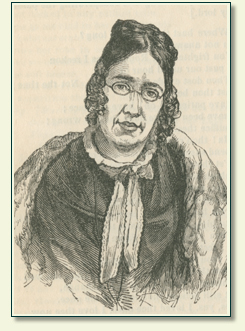
Sarah J. Hale, ed. Woman’s Record (1853), p. 578; also 1855 ed.
Catharine E. Beecher (1800 – 1878)
The eldest child of prominent New England minister the Rev. Lyman Beecher, Catharine Beecher devoted her life to enabling women to be more competent and contented in their roles as caretakers and homemakers. Through her published writing – cookbooks, textbooks, advice books, pamphlets, newspaper articles, and essays – and through her unflagging advocacy, she undertook to provide women with guidance for running their households and raising their children. Written collaboratively with younger sister Harriet Beecher Stowe, her most widely-read work was The American Woman's Home (1869), a repository of advice on childcare, healthcare, management of household finances, and other domestic duties.
In her efforts to expand educational opportunities for women, Catharine Beecher worked to improve a system in which teachers often possessed inadequate knowledge of academic material, girls pursued mostly "ornamental" activities such as embroidery or piano, and some communities, especially those in the rapidly expanding western frontier, had no schools at all. She founded academies for young women where instructors emphasized the importance of students' physical, moral, and intellectual development, and she created initiatives to bring schools and teachers to underserved regions. She also advocated the feminization of the teaching profession, claiming that women's nurturing, moral dispositions made them natural educators, thus opening up a decently paying, socially respectable career to women who needed – or chose – to work.
Unsympathetic to the politically-minded suffragists of the mid-19th century (she once criticized abolitionist women for stepping too far outside of the domestic sphere), Catharine Beecher's mission was nonetheless to ameliorate the conditions and raise the status of American women's day-to-day experiences. Interestingly, she herself was neither a wife nor a mother, having interpreted her fiancé's death in 1822 as her calling for an alternative vocation.

